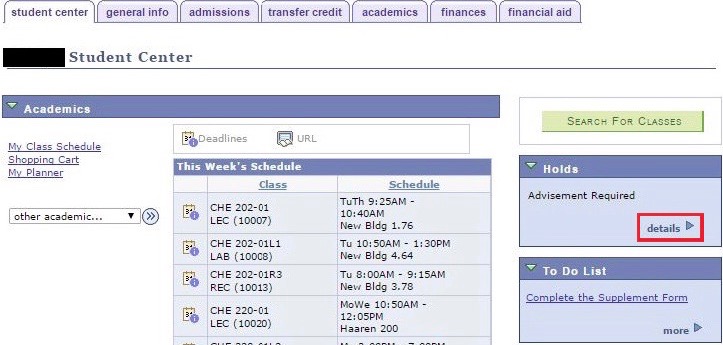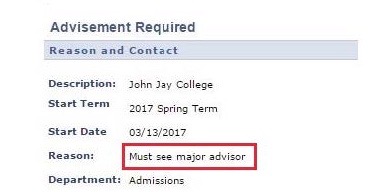Security Management Major Resources
The Security Management Major is designed for students who will become managers and professionals in private, public, and institutional workplaces which deal with a myriad of security applications and sectors. The courses introduce you to a variety of workplace challenges: operations, situational, technological, legal, and cyber-centered. Students benefit from studying in the corporate and institutional capital of security: the City of New York.
Here you will find:
- Key information about your major
- How and when to meet with your major advisor
- Planning tools that will help you track your progress in the major
- Ways to explore career opportunities related to the Security Management major
Take a few moments to look at the information below. It will help you plan effectively and avoid surprises during your studies at John Jay. Please visit the Department of Security, Fire & Emergency Management website for information, resources, and opportunities!
SEC Requirements
You are responsible for the major requirements that were in effect when you declared the major. To confirm the requirements you should be following, go to the Undergraduate Bulletin for that academic year. For example, if you declared the Security Management major in Fall 2015 or Spring 2016, you would click on the 2015-2016 Undergraduate Bulletin. If you declared the major and then left the College for more than one full semester, you’re responsible for the major requirements in effect when you return, if they have changed. Not sure when you declared the major? Find out here.
Below, find the Undergraduate Bulletin that was in effect when you declared the major.
- 2024-2025 Undergraduate Bulletin - SEC
- 2023-2024 Undergraduate Bulletin - SEC
- 2022-2023 Undergraduate Bulletin - SEC
- 2021-2022 Undergraduate Bulletin - SEC
- 2020-2021 Undergraduate Bulletin - SEC
- 2019-2020 Undergraduate Bulletin - SEC
- 2018-2019 Undergraduate Bulletin -SEC
- 2017-2018 Undergraduate Bulletin - SEC
- 2016-2017 Undergraduate Bulletin - SEC
- 2015-2016 Undergraduate Bulletin - SEC
- 2014-2015 Undergraduate Bulletin - SEC
- 2013-2014 Undergraduate Bulletin - SEC (PDF)pdf
- 2012-2013 Undergraduate Bulletin - SEC (PDF)pdf
No SEC major course can be used to fulfill your General Education Requirements. Refer to the General Education requirements page to view courses that meet the Gen Ed categories.
Major Advising
Security Management majors who need advising or wish more information on the program during the Spring 2025 semester can email Professor Robert McCrie (rmccrie@jjay.cuny.edu). His office hours will be Tuesday and Thursday 1:30 p.m. -3:00 p.m. and by appointment.
Students who are either majoring or minoring in Security Management or have questions about the program and would like advising during Summer session (June 2 - August 25) 2025 can email Professor Robert McCrie (rmccrie@jjay.cuny.edu). He can arrange to see students by appointment.
Sophomores with 45-59 credits may have a hold on their registration. The hold will be removed when they have a major advising appointment with Professor Robert McCrie (rmccrie@jjay.cuny.edu). This discussion will encourage wise planning and allow students to ask any questions they may have about the major. How do you know if you have a major hold? Go to CUNYfirst and complete the following steps:
- Check the Holds box of your CUNYfirst Student Center. If "Advisement Required" appears, click on “details.”

- Click on “Advisement Required.”

- See which type of advisement you need. If you must see a major advisor, then make a major advising appointment following the steps preferred by this department.

Plan Ahead: Graduate on Time
The SEC major has several courses that build on each other in a sequence, so it is important to be aware of this and plan accordingly. Keep the following guidelines in mind:
- Take SEC 101 early since it’s the foundation for other SEC courses. You must be eligible to enroll in ENG 101 in order to register for SEC 101. Completion of SEC 101 allows students to register for SEC 210 and SEC 211.
- Look ahead at all the major requirements to be aware of any necessary prerequisites for courses you want to take. For example, SEC 210 and SEC 211 serve as prerequisites (along with ENG 201) for most SEC 300-level courses.
- This major requires an internship (SEC 378). See the Required Internship section below for more information.
- Remember that you will need at least a 2.0 GPA in the major and at least a 2.0 overall GPA to graduate.
In your upper junior or senior year, you are required to complete an internship (SEC 378). As an intern, you will meet for at least 15 hours of class time with a faculty member and complete at least 96 hours at a workplace of your choosing.
Center for Career and Professional Development coordinates internships for SEC 378, so be sure to make an appointment with the Center to discuss internship possibilities.
Note: If you are currently employed in a security position, you will enroll for SEC 378 and will write an analytical paper or conduct an applied research study at your current workplace under the supervision of the internship instructor. If you work in law enforcement or are currently enrolled in a police academy, you are exempt from SEC 378. Be sure to discuss exemption with your major advisor.
- DegreeWorks degree audit - Use this online planning tool to track your overall progress toward graduation. You will see which of your general education and major requirements are completed, in progress, or still needed. Refer to the DegreeWorks FAQs to better understand how to use this helpful tool.
- Security Management Major Checklistpdf - Fill out this printable worksheet to keep track of which major requirements you have completed and which ones you still need.
- Sample Four Year Planpdf - See an example of how you could complete all your degree requirements (major, general education, electives) and graduate in four years! Remember that this sample plan shows just one possible way to combine your requirements. Transfer students in particular should work with advisors to determine a plan that works best for them.
A General Academic Advisor will confirm what general academic requirements you still need, make suggestions about smart course planning that will help you graduate without delays, discuss your interest in adding a minor or second major, inform you about opportunities such as study abroad, discuss general questions and concerns, and make helpful referrals. Visit the Academic Advisement Center's webpage for more information.
SEC and Careers

Security Management majors enter a wide variety of vocations. Listen to Professor Robert McCrie talk about how Security Management prepares you for a range of exciting job opportunities in a vital field that has a growing need for well-trained professionals.
Often graduates begin in security or emergency management-related positions and use their management skills to move into other related endeavors. Students find employment in the private, public, and institutional sectors. Many use the major as a foundation for entering law enforcement at the local, state, or federal levels. Every organization of consequence has the need for strategies to reduce loss and recover from untoward events. Here are examples of where security graduates are working:
- Art, museum, or cultural institution worker
- Building or facility management
- Campus or school safety practitioner
- Corporate risk analyst
- Corporate security manager or director
- Crime prevention specialist
- Cybercrime specialist
- Disaster recovery planner
- Emergency mitigation planner
- Executive/personal protection agent
- Fire safety worker
- Healthcare security manager
- Human resources facilitator
- Industry entrepreneur
- Intelligence analyst
- Investigator, detective, or fact-finder
- Loss prevention specialist
- Retail risk manager
- Risk management worker
- Safety practitioner
- Security industry sales and marketing
- Security technology designer
- Security trainer or educator
- Security-related researcher
For more info, take a look at Career Opportunities in Securitypdf#search=career%20opportunities%20in%20security%20management.
The Center for Career and Professional Development is a great resource for all questions related to job searches, internships, and career preparation. CCPD staff are available to meet individually with students and alumni in L72.00 New Building. To request a 45-minute counseling appointment, log on to John Jay Careers Online. 15-minute drop-in sessions are available all day Mon-Fri. (Stop by in person earlier the same day to schedule a drop-in session.)
Many graduates from the Security Management major go on to pursue a Masters of Science in Protection Management or a Masters of Science in Security Management. If you are interested in pursuing graduate studies, your major advisor and other SEC faculty members can offer guidance and perspective.